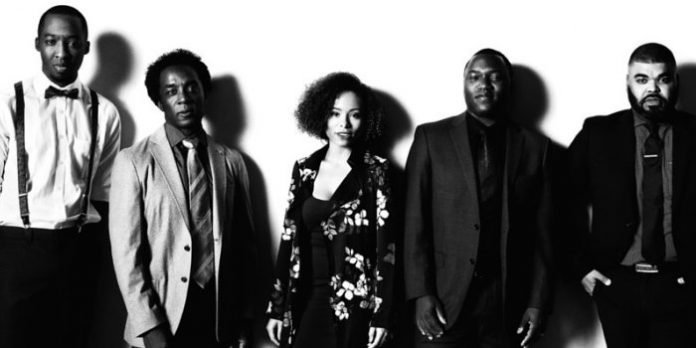Before your political correctness bristles at the very thought of a modern-day minstrel show, it is important to know this is not the minstrelsy of the early 19th century. Instead, in Young Jean Lee’s The Shipment, blackface is replaced by Black actors in a subversive exploration of Black identity.
“The Shipment tackles the way that African Americans are represented in the media, and how both depictions shape our human life,” explains co-director Omari Newton.
Originally consisting of comic skits, variety acts, dancing, and music performances of white people in blackface mocking African Americans, in The Shipment playwright Lee plays with those original minstrel tropes, challenging its stereotypes.
“While minstrel shows are inherently offensive, and the The Shipment is structured like one, the play deconstructs the minstrel show with a certain level of self-awareness and criticism,” says Newton.
And while minstrelsy is more-often-than-not viewed in a historical context, both Newton and co-director Kayvon Khoshkam see examples of these shows in today’s entertainment industry.
“It may not look like a traditional concept of minstrel show, we are still seeing the same kind of representation and interpretation in our modern media,” says Khoshkam.
“The overwhelming majority of mainstream hip-hop artists, I think, are performing some form of minstrelsy,” adds Newton. “Lil Wayne is a minstrel. Migos is a minstrel show. Even some of these reality shows featuring predominately Black casts who all just get loud and act stereotypically, are all modern-day minstrelsy.”
And while The Shipment tackles its subject matter largely from a Black perspective, Khoshkam also sees it on a more universal front.
“There is a universal element of perception and stereotypes that are going on, which any group or culture can relate,” he says, himself of Middle Eastern heritage.
It is perhaps through this multicultural lens where a Korean-American playwright has the temerity to write a show like The Shipment.
“[Lee] worked very closely with a cast who were all Black, and they workshopped the piece together,” explains Newton. “She wanted to give herself the challenge of writing about the Black experience.”
In fact, Lee hasn’t stopped, going onto write Straight White Men, a play she wrote to answer the question: ‘if I woke up tomorrow and I was a straight white man, what would I do?’”.
“I think she’s just a playwright who’s very interested in exploring opposites, and how it exists in white supremacy,” says Newton.
“I’m never surprised when issues of race and systemic racism are being addressed, and people have strong responses to it. I hope that people come to the play with an open mind, are enlightened, and will think about what they’re hearing.” – Omari Newton
While The Shipment all sounds very serious, Lee also uses the language of humour to help explore her themes.
“When we did our original reading to a predominantly non-Black audience, the incredible experience was to witness the laughter, which is the best way to join a room together,” says Khoshkam. “But then there was this wave of self-awareness. Why am I laughing at this? What is making me laugh about it? Where is that stemming from? Is that because of their performance, or something that I bring into the table, personally?”.
Khoshkam similarly appreciates how the playwright went about creating her play, a philosophy he has taken with him into the rehearsal hall.
“I’m obviously not a Black person, but the thing I loved about how she wrote the play was in asking questions, and listening,” he says. “I know for myself during this process I’ve come in to lead that way. I’m not going to be able to give direction on what the experience feels like, but I can listen and try to help facilitate that dialogue.”
For both, that conversation extends in providing a bridge for audiences who may be uneasy with the subject matter.
“There will be people who will feel polarized, uncomfortable, and who may be a little challenged by the content and the material, but we are having facilitated after-play discussions for every show to ensure that it is an open dialogue,” says Khoshkam.
“There are people who find Black Lives Matter offensive, and there are people who think Black Lives Matter is a terrorist organization,” adds Newton. “So, I’m never surprised when issues of race and systemic racism are being addressed, and people have strong responses to it. I hope that people come to the play with an open mind, are enlightened, and will think about what they’re hearing.”
The Shipment plays The Culture Lab at The Cultch from November 22 through December 2. Visit https://speakeasytheatre.ca for tickets and information.

